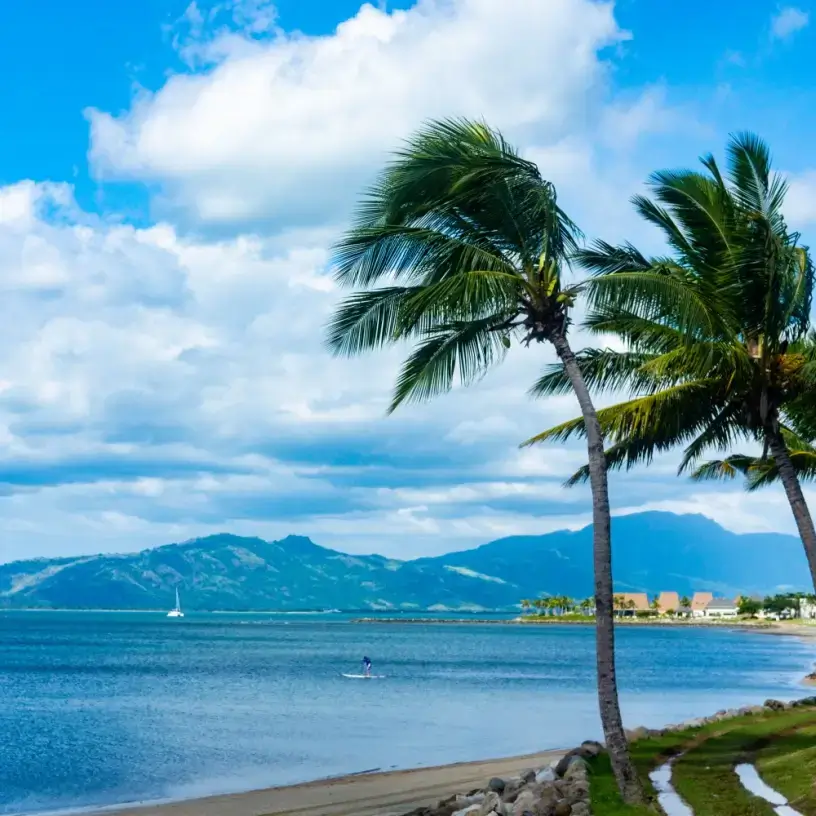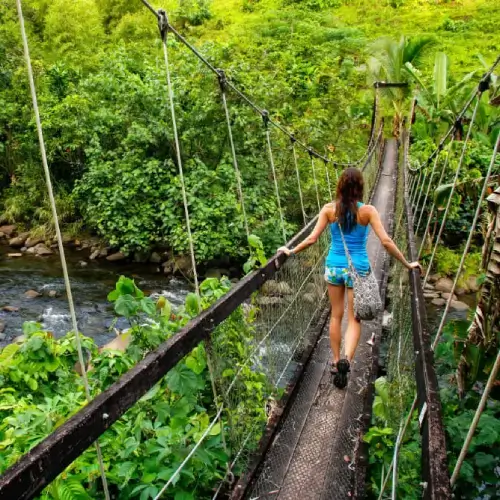Home / Compare Travel Insurance / Travel insurance for Fij…




Key takeaways
- You aren’t covered by Medicare or private health insurance while overseas, so without medical cover, you’ll need to pay for any medical bills yourself.
- The specific benefits of your policy will vary depending on your insurer, level of cover and whether you add any optional extras.
- The cost of your policy will be affected by the type of travel insurance, your level of cover, how long you’re travelling for and if you have pre-existing medical conditions.
Why take out travel insurance for Fiji?
Fiji is one of Australia’s closest neighbours in the South Pacific and has hundreds of islands to explore. International travel insurance for Fiji can provide peace of mind for your tropical getaway. Some benefits of travel insurance for Fiji that could help protect your holiday include:
- Medical cover if you’re injured or ill and need to return to Australia for urgent medical care.
- Reimbursement for your belongings if they’re stolen or damaged while on holiday, provided you didn’t leave them unsupervised in public.
- If a natural disaster occurs in Fiji before your trip begins and you need to reschedule or cancel your plans.
Choosing cover for your trip to Fiji
If you’re looking for the best travel insurance for Fiji, you need to consider your personal needs, as well as your itinerary for your trip. For example, before choosing your travel insurance policy, you should consider the following:
- What you need to be covered for; do you have pre-existing conditions that need insuring or need higher limits on your luggage cover?
- If you plan for adventure, you should check what activities are automatically covered on your policy and whether you need extra adventure cover for certain activities.
- Any exclusions or limits that might affect your ability to claim on your policy.
Expert tips for choosing the right travel insurance for Fiji
Our travel insurance expert, Adrian Taylor, has inside tips for you to help you choose a suitable travel insurance policy for Fiji.

Keep an eye on your belongings
Don’t leave your possessions unattended in a public place as any theft claims may not be accepted. All policies have limits, conditions and exclusions and you need to understand these to ensure you have the cover you need.
Buy travel insurance as soon as you book
To maximise the value from your travel insurance, purchase your policy as soon as you make a booking or pay any deposits. Once you do, you may have cancellation cover to protect you from losing out on deposits if your trip is disrupted or you unexpectedly need to cancel.
Match your cover to your needs
The specifics of your travel insurance cover will vary depending on your itinerary and individual needs. For example, if you plan to hit up Fiji while on a cruise, you’ll need to purchase cruise cover as an optional extra. Check your policy to make sure you’re covered for all the activities you plan to get involved in while on holiday.
About travel insurance for Fiji
Do I need travel insurance for Fiji?

The decision to buy travel insurance comes down to you and your trip’s needs. However, we believe every traveller could benefit from travel insurance, no matter where you’re going, as you can never predict when unexpected events might cause disruptions to your travel plans.
Comprehensive travel insurance can cover you for a range of events and scenarios, such as medical costs (e.g. repatriation, medical evacuation, fees for medical treatment), cancelled travel plans, rental car excess and more. Or if you’re looking for something more budget-friendly, you may find cheap travel insurance for Fiji with a medical-only policy. It’s important to not only have coverage but also the right coverage.
What should my travel insurance policy for Fiji include?
Here are five things you should consider including in your travel insurance cover for Fiji. If you’re travelling with dependants, you should also look for a policy that includes them in your cover; learn more about travel insurance for families.
Emergency medical and hospital expenses
Australia doesn’t have a Reciprocal Health Care Agreement with Fiji, meaning some hospitals may require you to pay for treatment upfront.1 Including coverage for medical expenses in your travel insurance policy may ensure you don’t have to pay entirely out of your own pocket. Your cover will typically also include medical evacuation back to Australia in the event of serious illness or injury.
Adventure activities
Fiji offers all sorts of adventure activities, like diving, snorkelling, sailing and surfing. While some insurance providers may not include these activities automatically, you may be able to include coverage for them as an optional extra on your travel insurance policy.
Lost, stolen or damaged luggage and belongings
You may be able to claim back the value (or up to a certain value) of your luggage and belongings should they be lost, stolen or damaged during your trip. The same can apply to your travel documents (although some insurers may only offer this as part of comprehensive or annual multi-trip policies).
Cancellation, delay or amendment costs
If you need to cancel your journey or experience travel delays because of circumstances outside your control (like an injury or an illness), you may be able to claim for the non-refundable portion of unused travel and accommodation expenses, as well as cancellation fees.
Scooter and motorbike cover
Similar to adventure activities, scooter and motorbike cover is typically offered as an optional extra. If you drive a motorbike, moped or scooter without this cover, you may not be covered for any medical costs if you’re in an accident. Keep in mind you’ll need a valid Australian car license, or motorcycle license if driving a motorbike over 50cc. If you don’t have a valid license or drive without a helmet and are injured, any medical claims won’t be accepted.
The full inclusions, exclusions, limits and sub-limits of a policy are outlined in the policy’s Product Disclosure Statement (PDS). You can also find out whether a policy matches your circumstances by reading the Target Market Determination (TMD).
What does travel insurance for Fiji exclude?
While travel insurance can help you in tricky situations and give you peace of mind, there are some things it doesn’t cover. Specific exclusions may differ between policies and providers, but here are some to look out for:
- Unattended luggage. While travel insurance can cover the value of your lost or stolen luggage, you may not be covered if it was left unattended in a public place at the time of the incident.
- Illegal, reckless or dangerous behaviour. If you’re claiming because of an incident where you knowingly acted illegally, recklessly or dangerously, you may find your claim rejected.
- Intoxication. Your provider might reject your claim for injury if you were under the influence of drugs or alcohol at the time of the incident, even if it wasn’t your fault.
- Unlicensed scuba diving. If you’re scuba diving without a license or a properly licensed supervisor, you may not be covered by your policy.
- Pre-existing medical conditions. Depending on the policy, some insurers might request that you pay additional premiums to cover medical conditions you had prior to buying the policy.
- Ignoring government warnings. Your travel insurer may not cover you on your trip to Fiji if you travel against any of the warnings listed on the government’s Smartraveller website.
Always read the PDS before purchasing a policy to ensure that you have the cover you need.
Is Fiji safe to travel to?
Dangers in Fiji

Usually, Fiji has a relatively low level of risk and is typically a safe place to visit. However, there are still some potential dangers Australian visitors should be aware of.
Natural disasters
There is the occasional natural disaster in Fiji, with the possibility of:
- Floods in downtown Nadi and the Coral Coast
- Landslides
- Cyclones
- Earthquakes and tsunamis
- Volcanoes.
Travellers are advised to know their accommodation’s evacuation plan and find shelter as soon as possible, following advice from local officials.
Theft and crime
As with many countries, tourists are more likely to be targets of crime in Fiji than locals, and things like robbery, theft, assault and worse are a possibility. However, Smartraveller describes most crime in Fiji as ‘opportunistic’ with the highest risk being in urban areas at night.1
Credit card fraud and skimming is also rife in urban areas in Fiji, so travellers are advised to stay alert when using ATMs and carrying cash.
Wildlife
Fiji is home to potential threats, such as blue ringed octopuses and box jellyfish, but there are smaller threats you’re more likely to encounter.
According to Smartraveller, mosquito-borne illnesses (including dengue fever and Zika) are common.1 So, make sure you’re up to date on any vaccinations you might need prior to travelling.
Important contacts in Fiji
You should find out which official departments you can contact for help if you get in trouble or require emergency assistance in Fiji. These include:
- Emergency services. Call 911 for fire and rescue and medical help, and 917 for the police.
- The Australian High Commission. For consular assistance, speak to the Australian High Commission in Suva.
- 24-hour Consular Emergency Centre. If you can’t contact the Australian High Commission, call +61 2 6261 3305 from overseas.
Above all, make sure your emergency contacts are up to date and that you know how to contact your travel insurer, too.
Meet our travel insurance expert, Adrian Taylor
As a General Insurance expert with over 13 years’ experience in financial services, Adrian Taylor believes in educating customers about the importance of travel insurance so that anyone can kick back and make the most of their time away from home. While no one wants a disrupted holiday, a suitable travel insurance policy can provide a financial safety net for yourself, your belongings and your trip in case things go wrong.
Want to know more about travel insurance?
1 Australian Government, Department of Foreign Affairs and Trade – Smartraveller. Fiji. Last updated January 2025. Accessed February 2025.

